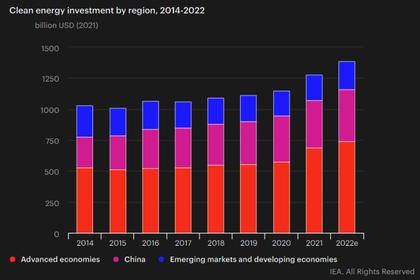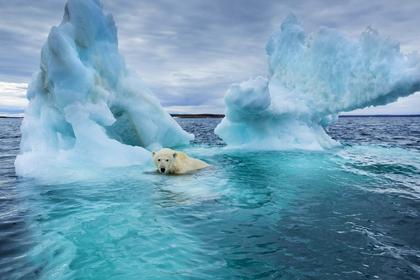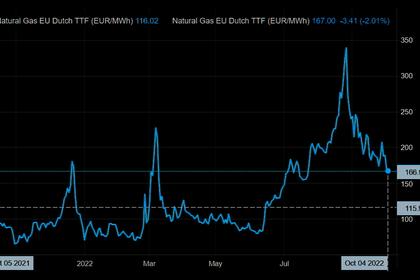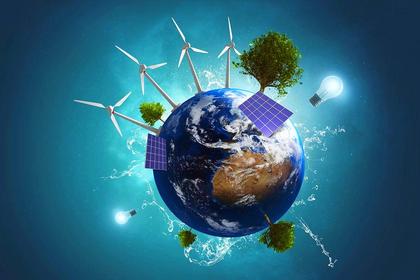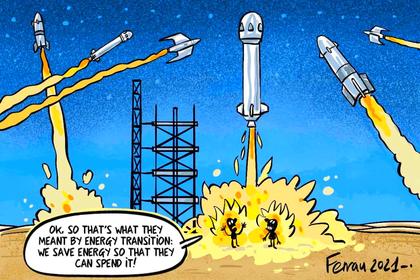
GLOBAL ENERGY RESILIENCE

PLATTS - 25 Oct 2022 - Our global energy systems, launched through the Paris Agreement on a transition to a world aspiring to net-zero emissions, have found through the war in Ukraine that they do not have the resilience to keep the world supplied with the resources needed to sustain jobs and economic growth.
Today, we face a new imperative: to balance energy security, transition and sustainability – to meet global demand for the fuels that drive our global economy, and to build the energy systems to redress climate change. Meeting this challenge will be a core theme before the delegates of ADIPEC 2022, taking place in Abu Dhabi at the end of this month.
Lesson one is that energy security and energy transition must be in balance to sustain energy systems that are also affordable. The jump to a net-zero world cannot occur without investing in and building a new energy economy. That will occur in phases. The phase out of our existing energy systems must be synchronized with the buildup of low-carbon and net-zero energy solutions.
Failure to manage this balance will create economic and political tensions that will disrupt or even explode the capacity of the transition. The war in Ukraine and its impact on Europe is the most profound illustration yet of the potential economic and social dislocation and political risks. To be sure, whether future disruptions are technical, commercial or geopolitical, all will carry risks of social and economic dislocation if our energy systems do not create alternatives.
Knowing that such disruptions are inevitable places a premium on resilience – to preempt or hedge major disruptions and support continuity of the energy transition. While there may not be universal solutions – countries and regions vary – here are five reflections on building resilience to balance energy transition, security and affordability that draws on lessons from regional experience:
1. Technology and finance for developing countries
Developing countries host the majority of the world's population. And today they are hit by a fourfold shock: higher commodity prices, pressure not to develop their hydrocarbons, currency devaluations that are exploding the local cost of their debt, and yet higher costs of capital. Bridging a growing north-south divide demands a comprehensive treatment of developing country debt to free up resources to invest in energy and social services. Creative financing through international financial institutions and development agencies are needed to take the first risk of defaults and reduce the cost of capital. International oil and gas companies should be encouraged to invest in developing countries with commercial oil and gas resources and to transfer technologies on decarbonization. Without such a comprehensive response, the north-south polarization will grow, along with the global risks that come with it.
2. Natural gas
Europe's crisis is rooted in relying on a single source of natural gas and inadequate alternatives. LNG already plays a critical role in replacing Russian gas in 2022. The UAE, having committed to double its LNG production by 2026, is well-positioned to help plug the gap in European and global gas markets, as reflected in UAE's recent LNG deal with Germany. Gas has been an indispensable fuel for high temperature industrial requirements like steel and cement, to provide baseload power to balance the intermittency of renewables, and for residential and industrial heating. The debate on gas should not be terminating an affordable hedge that supports the energy transition. Rather, the focus should be on securing a dual-purpose gas infrastructure that can move to sustainable gases such as hydrogen.
3. Permitting
If there is an issue that evokes consensus between renewable energy and pipeline developers, it is the slow pace of issuing permits. Depending on national governance structures, federal authorities must fill a critical gap and work with developers decentralized agencies to set criteria where projects can be fast-tracked and to establish limits for legal review. If countries cannot bring existing technologies like wind and solar online, what are the incentives to invest in new and riskier technologies?
4. Hydrogen and carbon capture, utilization and storage (CCUS) projects
Delays in technologies, commercial viability and infrastructure investments in renewable power could undermine the decarbonization strategies for hard to abate sectors such as steel, cement and glass. Europe has made hydrogen a lynchpin to transition from the role of natural gas in industry, power storage, balancing renewables intermittency, and heating. CCUS can play a central role in global decarbonization, but that will require innovation and rapid delivery at scale.
5. Supply chains
Supply chains are a new point of fragility in national security. Critical minerals or metals are concentrated in a few (and sometimes volatile) countries. Crises over microchips have highlighted the risk of concentrated ownership and processing of many key components. Environmental and social constraints to expand processing in OECD countries indirectly add to the concentration of control. And it could take years or decades to find and put into operation alternative supplies that are, for example, critical for electric vehicles.
Perhaps the simplest policy lesson is the need to institutionalize in governments, industry and the financial sector, credible mechanisms to model our energy futures and the resilience of roadmaps to net-zero. The war in Ukraine was a massive geopolitical shock. There will be others, and not just geopolitical. Against every net-zero road – in companies and countries – what are the plan Bs and Cs?
-----
Earlier:

